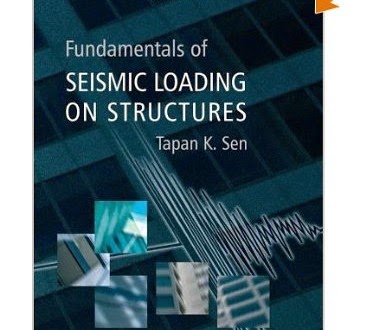كتاب fundamentals of seismic loading on structures

كتاب fundamentals of seismic loading on structures
من الكتب المهمة والأساسية لفهم الزلازل وتأثيرها على المنشئات

Table of Contents محتويات الكتاب
Preface.
Acknowledgements.
1 Introduction to Earthquakes.
1.1 A Historical Perspective.
1.2 The Nature of Earthquakes.
1.3 Plate Tectonics.
1.4 Focus and Epicentre.
1.5 Seismic Waves.
1.6 Seismometers.
1.7 Magnitude and Intensity.
1.8 Reid’s Elastic Rebound Theory.
1.9 Significant Milestones in Earthquake Engineering.
1.10 Seismic Tomography.
1.11 References.
2 Single Degree of Freedom Systems.
2.1 Introduction.
2.2 Free Vibration.
2.3 Periodic Forcing Function.
2.4 Arbitrary Forcing Function.
2.5 References.
3 Systems with Many Degrees of Freedom.
3.1 Introduction.
3.2 Lumped Parameter Systems with Two Degrees of Freedom.
3.3 Lumped Parameter Systems with more than Two Degrees of Freedom.
3.4 Mode Superposition.
3.5 Damping Orthogonality.
3.6 Non-linear Dynamic Analysis.
3.7 References.
4 Basics of Random Vibrations.
4.1 Introduction.
4.2 Concepts of Probability.
4.3 Harmonic Analysis.
4.4 Numerical Integration Scheme for Frequency Content.
4.5 A Worked Example (Erzincan, 1992).
4.6 References.
5 Ground Motion Characteristics.
5.1 Characteristics of Ground Motion.
5.2 Ground Motion Parameters.
5.3 References.
6 Introduction to Response Spectra.
6.1 General Concepts.
6.2 Design Response Spectra.
6.3 Site Dependent Response Spectra.
6.4 Inelastic Response Spectra.
6.5 References.
7 Probabilistic Seismic Hazard Analysis.
7.1 Introduction.
7.2 Basic Steps in Probabilistic Seismic Hazard Analysis (PSHA).
7.3 Guide to Analytical Steps.
7.4 PSHA as Introduced by Cornell.
7.5 Monte Carlo Simulation Techniques.
7.6 Construction of Uniform Hazard Spectrum.
7.7 Further Computational Considerations.
7.8 References.
8 Code Provisions.
8.1 Introduction.
8.2 Static Force Procedure.
8.3 IBC 2006.
8.4 Eurocode 8.
8.5 A Worked Example (IBC 2000).
8.6 References.
9 Inelastic Analysis and Design Concepts (with Particular Reference to H-Sections).
9.1 Introduction.
9.2 Behaviour of Beam Columns.
9.3 Full Scale Laboratory Tests.
9.4 Concepts and Issues: Frames Subjected to Seismic Loading.
9.5 Proceeding with Dynamic Analysis (MDOF systems).
9.6 Behaviour of Steel Members under Cyclic Loading.
9.7 Energy Dissipating Devices.
9.8 References.
10 Soil-Structure Interaction Issues.
10.1 Introduction.
10.2 Definition of the Problem.
10.3 Damaging Effects due to Amplification.
10.4 Damaging Effects Due to Liquefaction.
10.5 References.
11 Liquefaction.
11.1 Definition and Description.
11.2 Evaluation of Liquefaction Resistance.
11.3 Liquefaction Analysis – Worked Example.
11.4 SPT Correlation for Assessing Liquefaction.
11.5 Influence of Fines Content.
11.6 Evaluation of Liquefaction Potential of Clay (cohesive) Soil.
11.7 Construction of Foundations of Structures in the Earthquake Zones Susceptible to Liquefaction.
11.8 References.
12 Performance Based Seismic Engineering – An Introduction.
12.1 Preamble.
12.2 Background to Current Developments.
12.3 Performance-Based Methodology.
12.4 Current Analysis Procedures.
12.5 Second Generation Tools for PBSE.
12.6 References.
Index

للتحميل
من هنا
أو
كتاب fundamentals of seismic loading on structures
 مراجعة بواسطة Smart Engineers
في
10:31 ص
تقييم:
مراجعة بواسطة Smart Engineers
في
10:31 ص
تقييم:
 مراجعة بواسطة Smart Engineers
في
10:31 ص
تقييم:
مراجعة بواسطة Smart Engineers
في
10:31 ص
تقييم:
ليست هناك تعليقات: